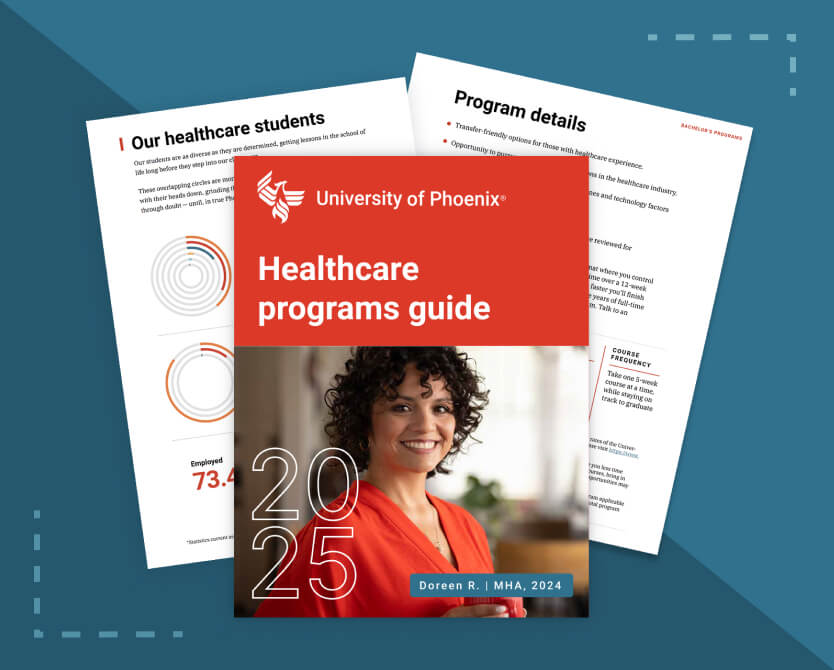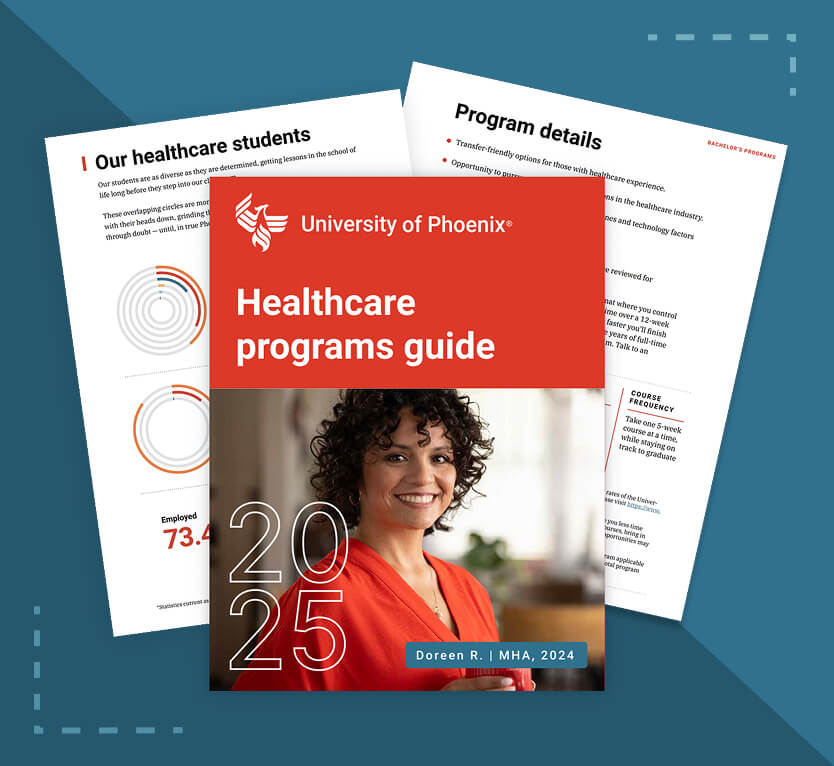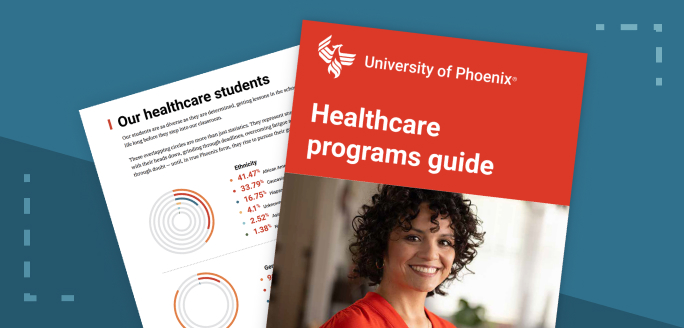Articles > Healthcare > A guide to entry-level healthcare jobs
A guide to entry-level healthcare jobs

Written by Michael Feder

Reviewed by Mark Jóhannsson, DHSc, MPH, Dean, College of Health Professions

Are you hoping to start a career in healthcare? The good news is there are many entry-level healthcare jobs to choose from. These roles are generally in three categories -- patient-facing, administrative, and support. Take a look and see what appeals to you!
The outlook for entry-level healthcare jobs
Employment in healthcare occupations is projected to grow much faster than the average for all occupations from 2022 to 2032, according to the U.S. Bureau of Labor Statistics (BLS). About 1.8 million openings are projected each year, on averageand those include entry-level jobs to consider.
BLS Occupational Employment Projections, 2022-2032 is published by the U.S. Bureau of Labor Statistics. This data reflects BLS’ projections of national (not local) conditions. These data points are not specific to University of Phoenix students or graduates.
Some entry-level healthcare jobs to explore
The following entry-level healthcare jobs can help you gain experience in a variety of healthcare careers, depending on your interest.
Patient service representative
Patient service representatives are the people who first interact with many patients. In this role, one takes down relevant health information and asks questions that inform healthcare treatment plans. You need strong oral communication skills to successfully perform the intake process. A high school diploma or equivalent is typically required to become a patient service representative.
Patient service representatives can also be seen as customer service representatives. To become a customer service representative, typically a degree is not required and a high school degree or equivalent will suffice, according to BLS. Being able to effectively communicate is an important quality many employers look for.
Psychiatric aide
A psychiatric aide provides critical care for patients experiencing mental or emotional health conditions. Working alongside other healthcare team members, psychiatric aides specialize in the care and treatment of individuals seeking support for their mental health.
Psychiatric aides depend on skills like empathy, listening, communication, problem-solving and decision-making while navigating core care responsibilities. You might help patients perform basic daily functions, including eating, bathing and moving from a residence to a treatment room.
Psychiatric aides typically have a high school diploma, a postsecondary certificate and/or education in nursing as well as experience as a nursing assistant or licensed practical nurse.
Health information technician
As a health information technician, it’s your job to verify that medical records at a health organization are correct, updated, compliant and secure. You might also manually update patient electronic health records, typically stored in an on-site server or cloud database. You’ll help to manage your facility’s health information technology —the electronic systems your organization uses to collect, store and analyze health data.
To become a health information technician, you need to obtain at least a high school diploma. Other employers may require a related undergraduate degree, and some states also require a postsecondary certificate.
Certified nursing assistant
Certified nursing assistants (CNAs) provide basic care to patients, such as checking their vitals and documenting their food and drink intake, under the direction of registered nurses. In addition to hard skills in data analysis, health informatics and record keeping, CNAs must have great interpersonal skills since they interact directly with patients and their families.
Before employment, most CNAs must complete a state-approved education program to pass a core competency examination. Nurse assistant candidates typically also need at least a high school diploma or an educational equivalent.
Patient sitter
Patient sitters help monitor and assist patients in need of supervision. As a patient sitter, it’s your responsibility to compassionately care for patients in a medical facility, particularly those who might be experiencing health complications. You’ll rely on skills like communication, patience, problem-solving and flexibility.
BLS categorizes patient sitters as home health aides. To become a patient sitter, you’ll likely need a high school diploma, though this position does not require any formal education.
Medical secretary
Medical secretaries use their knowledge of lab procedures, treatment plans and facilities to fulfill both clinical and clerical tasks. Medical secretaries might help schedule appointments, document billing information, update medical records, or aggregate and provide reports for healthcare professionals. You might also answer phones, interview patients and greet visitors.
BLS includes this role in the same category as general secretaries and administrative assistants. Typically, all that is needed to become a medical secretary is a high school diploma or equivalent, although some employers may require additional training.
Medical laboratory technician
Medical laboratory technicians work to maintain the technology in a healthcare environment, often helping professionals use devices that provide direct treatment. They help install, calibrate and maintain lab equipment used in a medical facility. They also help prepare or analyze collected samples, as well as educate other members of a healthcare team on technology use.
To become a clinical laboratory technologist, applicants typically need a bachelor’s degree. Technicians need at least a high school diploma. Some employers and states may also require a postsecondary certificate.
Home health aide
A home health aide provides a wide variety of home healthcare services to patients with disabilities or chronic illnesses. This can be a very hands-on and physical position. A home health aide may have to assist a patient in bathing, dressing and using the bathroom. Their job can include housekeeping tasks such as cooking and cleaning. Most importantly, they need to know basic safety techniques to care for the patient outside of a healthcare environment in case there is an emergency.
Aspiring home health aides must have a high school diploma or the educational equivalent. If you plan to work for a home health or hospice agency, you’ll likely need to pass a competency exam and complete additional training.
Pharmacy technician
After reviewing prescriptions for accuracy, pharmacy technicians prepare and distribute prescribed medication directly to patients. People in these entry-level healthcare jobs also help pharmacists perform daily administrative tasks, such as processing patient insurance and updating health records.
You’ll need skills and knowledge related to bookkeeping, data entry, math, pharmacology and chemistry to land a job as a pharmacy technician. Pharmacy technicians also need soft skills to communicate with patients, explain dosages and address patient concerns.
To begin a career as a pharmacy technician, you need a high school diploma or the equivalent. Most states require passing a specified exam or training program as well.
Community health worker
Community health workers are advocates for their community. They are the voice on behalf of their communities when addressing residents’ needs with healthcare providers and social service organizations. They also collect data to understand community issues and provide wellness strategies to improve on them.
To become a community health worker, a high school degree is typically needed, along with on-the-job training, although some jobs may require a postsecondary education. Some states may also require their applicants to be certified.
While looking for entry-level healthcare jobs, explore education opportunities as well
While the above career outcomes are entry-level healthcare jobs and don’t require a college degree in most cases, here are some additional educational options available at University of Phoenix that you may want to consider if you’re eager to learn more about healthcare or nursing:
- Bachelor of Science in Health Administration: With four elective track options, this online healthcare administration degree program covers business management, compliance, finance, information management and more.
- Bachelor of Science in Health Management: Interested in the business and regulatory needs of a healthcare organization? This online health management degree program focuses on management, technology, compliance and related subjects.
- Master of Health Administration/Master of Business Administration: Position yourself to become a leader in healthcare with this dual degree focusing on healthcare administration, accounting and marketing.
- Master of Public Health with a concentration in Community Health Leadership: In this online master of public health degree program you will learn how to assess and advocate for the health needs of communities, analyze data related to the health of a target community, mobilize and engage community stakeholders and more.
- RN to Bachelor of Science in Nursing: This online RN to BSN degree program is designed to enhance the nursing careers of registered nurses. A BSN can help prepare you for careers such as a charge nurse, public health nurse or director of nursing.

ABOUT THE AUTHOR
A graduate of Johns Hopkins University and its Writing Seminars program and winner of the Stephen A. Dixon Literary Prize, Michael Feder brings an eye for detail and a passion for research to every article he writes. His academic and professional background includes experience in marketing, content development, script writing and SEO. Today, he works as a multimedia specialist at University of Phoenix where he covers a variety of topics ranging from healthcare to IT.

ABOUT THE REVIEWER
Mark Jóhannsson is the Dean of the College of Health Professions. He has a career spanning over 35 years of healthcare management, public health practice, higher education administration, teaching and clinical/behavioral research within corporate, community and academic settings. He has served as both an educational and keynote speaker, and he has been published in a variety of peer-reviewed and periodic literature.
This article has been vetted by University of Phoenix's editorial advisory committee.
Read more about our editorial process.




Get your free Healthcare programs guide
Explore our healthcare degrees and certificates - 100% of our programs are aligned to career-relevant skills.
You’re making moves!
This guide is loaded with answers. Download it now or get it from your inbox. Questions? We’re just a call or click away.
Get your free healthcare programs guide. Please enter your first and last name.
You’re making moves!
This guide is loaded with answers. Download it now or get it from your inbox. Questions? We’re just a call or click away.


